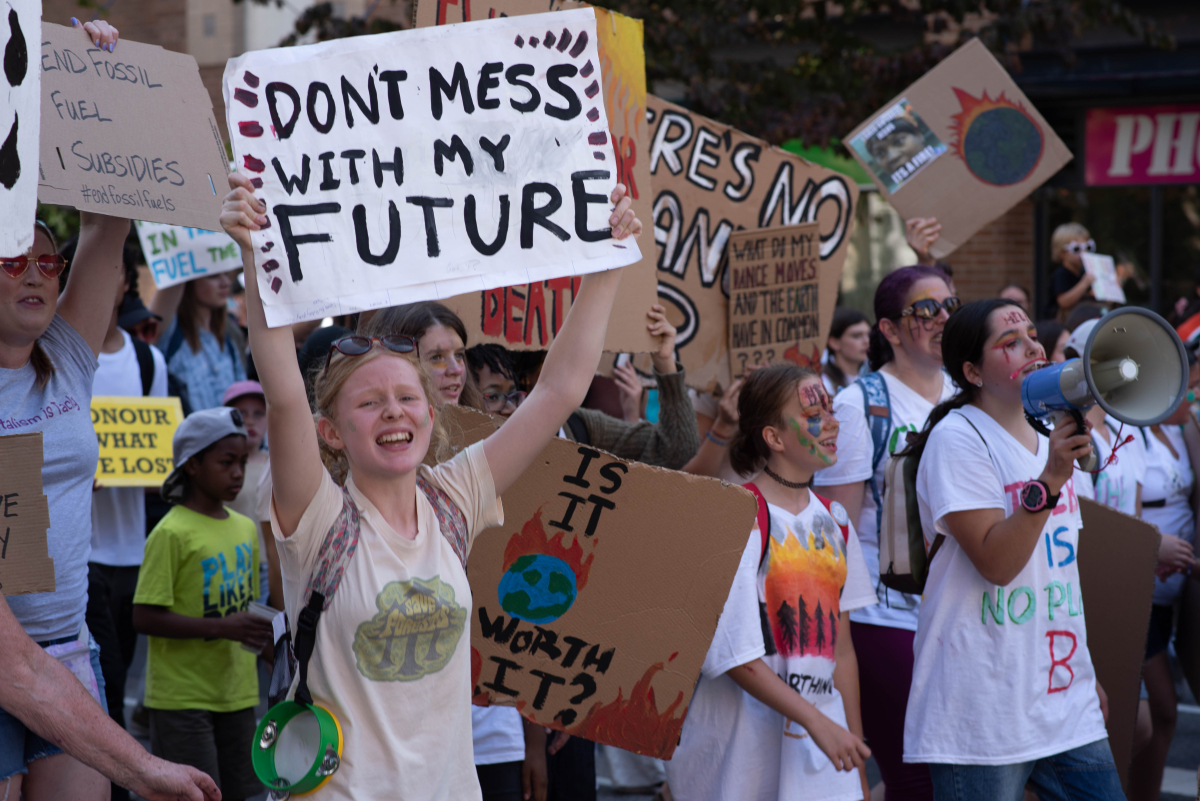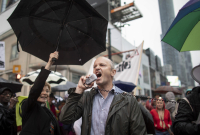Support strong Canadian climate journalism for 2025
Kids used to play outside all summer. But after choking on record wildfire smoke and suffocating through the hottest summer in human history, the youth of Canada know playtime is over. Instead, in a country that’s warming twice as fast as the rest of the world, we have to fight for a future where our children will still be able to breathe.
As a recent alumnus from the University of British Columbia, I helped organize massive strikes last weekend in tandem with over 50 Canadian cities and thousands of others worldwide. In Vancouver, we brought 5,000 protesters to the streets to demand a hard cap on oil and gas emissions and a fair phaseout of fossil fuels. We spent countless hours on these actions because we can’t allow Big Oil to drill through our future and are committed to rebuilding the robust, formidable movement we so desperately need.
In 2019, millions of us around the world walked out of our classrooms to strike for our future. In Vancouver alone, we stood 100,000 strong, and in Montreal, there were 500,000 of us demanding change. The scale of the problem felt dizzying. Desperate for a sense of control, we recycled religiously, biked everywhere and talked to friends and family about climate action. Yet, it made little difference because individuals aren’t to blame for the climate crisis — the fossil fuel industry is.
While millions of Canadians have been hard at work making changes in their own lives, the oil industry continues with business as usual, scoring record-breaking profits by wrecking our planet. Big Oil has spent decades distorting climate science, dispossessing Indigenous peoples from their lands, shifting the blame onto individuals and lobbying governments to prevent meaningful action. Most recently, the CEO of Suncor, Canada’s largest oil corporation, openly admitted that it will be “returning to its oil production roots” after being “too focused” on the energy transition, despite its emissions hitting an all-time high this year.
That’s why this year’s march was different.
For the first time, we led global climate strikes that took aim directly at Big Oil and demanded a fair, fast phaseout of fossil fuels. As organizers, we wondered if this was a leap people were ready for. The answer was a resounding, YES. Last weekend, countless hands held homemade placards calling out the industry for its climate crimes. Our strikes brought out throngs of people who are anxious about climate change, but less familiar with its causes and hungry for answers.
This year’s strike in Toronto offered one of the most intergenerational and intersectional organizing teams to date; the incredible diversity of attendees was testimony to the power of building bridges between causes. However, with just a few months of preparation, other groups struggled to form intergenerational, cross-movement coalitions.
Some shared they lacked the deliberate structure necessary to mitigate power dynamics and offer young people a voice at the organizing table. Countless lessons will be digested in the coming weeks, an essential and often ignored part of the movement-building process.
If there were fewer of us this year compared to 2019, it’s because we’re rebuilding after a long hiatus. The youth leaders who rose with Greta Thunberg have moved on to the workforce, many disillusioned by the limited scale of concrete progress. Every major social movement of the past 20 years has experienced a major collapse where activists felt that their movement was too small and futile in the face of its opposing interests. This is where we hit a wall, where our hunger for instantaneous change rubbed against the time scales of successful social movements.
The climate movement is back, but we need your help to keep it that way. No successful movement in history won with a single day of action. Rather, it takes sustained effort to seize cumulative “movement moments” where in the process, we collectively build up the organizing chops, deep friendships and cross-movement bridges that help us win. We invite you to take part in the joyful, messy process of becoming more alive, more resilient and more powerful together.
If you’re short on time, visit Cap Pollution to take action. This upcoming federal emissions cap is our best chance to rein in the uncontrolled damage perpetuated by the fossil fuel industry, but the industry is going all out to derail it. Feeling inspired by a fair phaseout and collective solutions?
Take part in 350’s Power Up to help organize global action on Nov. 3 and Nov. 4. Show up in solidarity for those on the front lines of resource extraction battles, or start today by donating to Wet’suwet’en land defenders.
If there’s a gap in your local climate organizing, help fill it with the support of the Climate Justice HUB. If nothing else, make climate personal by getting involved at work, in your union or through your hobbies.
History shows we can’t trust Big Oil to regulate itself. It’s time to stop the industry from sacrificing our collective futures at the altar of short-term profit. And just like in 2019, it’s time to uplift more regular folks to demand real solutions. We must bring in unions and schools, businesses and artists.
We can’t stop until the average teen, the moderate parent and your great-aunt down the block know what the real solutions are, where to point fingers and why they belong in our organizing spaces.
This is not a fight we can afford to lose.
We need all hands on deck.
Chloë Fraser is a multimedia storyteller living on the stolen lands of Vancouver, B.C. She enjoys sharing community-powered stories with a special focus on the environment. Chloë recently graduated from UBC in international relations and creative writing, where she led a seminar on inclusive climate communications.






Comments